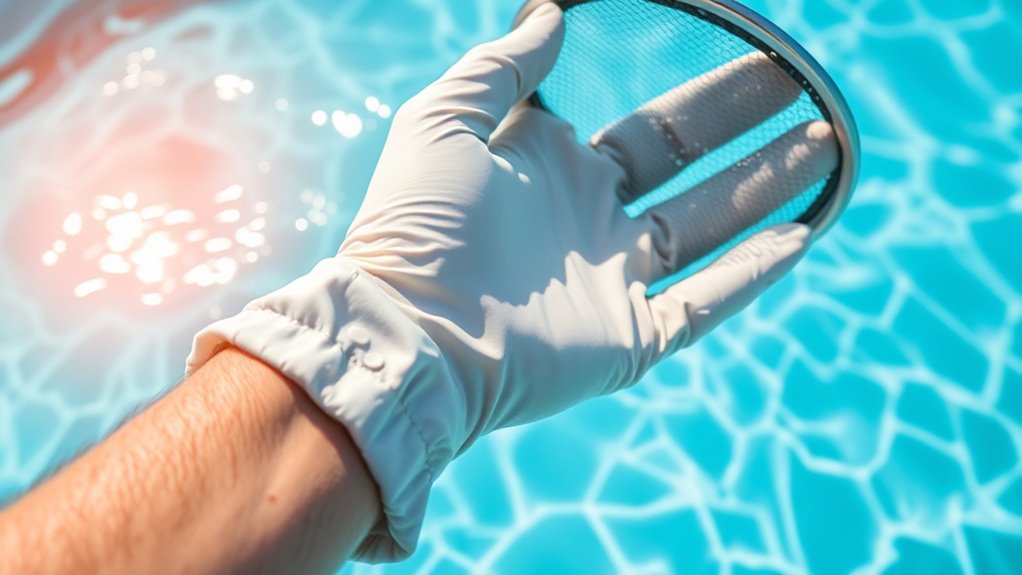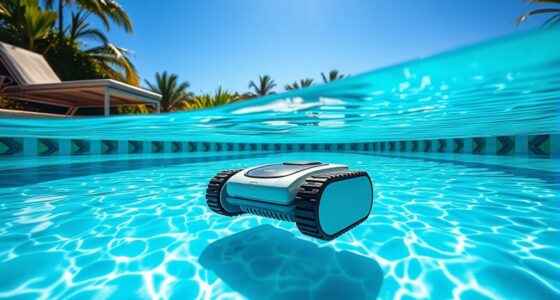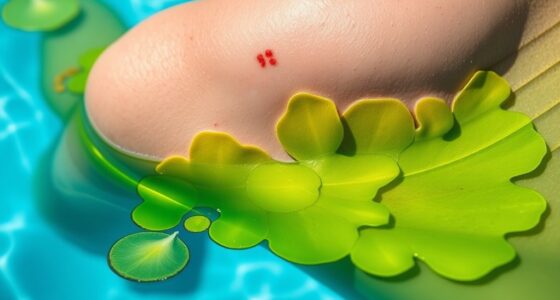If you have sensitive skin, you should take extra precautions when cleaning your pool. Always wear gloves, goggles, and protective clothing to prevent direct contact with chemicals like chlorine and algaecides. Add chemicals slowly in well-ventilated areas, and wash your hands thoroughly afterward. Proper storage and following label instructions are essential to avoid accidental reactions. Keep your skin safe by managing chemical use carefully — more tips await to help you maintain a healthy, irritation-free pool experience.
Key Takeaways
- Wear protective gear like gloves and goggles to prevent skin contact with chemicals during pool cleaning.
- Use proper dilution and follow label instructions to minimize chemical fumes and skin irritation risks.
- Wash skin immediately with soap and water if exposed to chemicals, especially for sensitive skin.
- Store chemicals in airtight containers away from sunlight, children, and pets to prevent accidental exposure.
- Regularly monitor skin for irritation or allergic reactions and adjust protective measures accordingly.

Cleaning your pool regularly is essential to keep the water safe and inviting, but it also exposes you to various chemicals used in the process. When you perform pool maintenance, you’re often handling substances like chlorine, pH balancers, algaecides, and shock treatments. While these chemicals are necessary to prevent bacteria growth and keep the water clear, they can pose risks, especially if you have sensitive skin. Understanding chemical safety is crucial to protect yourself from irritation, allergic reactions, or more serious health issues.
Regular pool maintenance involves handling chemicals that can irritate sensitive skin.
During routine cleaning, you might come into contact with these chemicals through direct handling, splashing, or even inhalation of fumes. If you’re not cautious, chemicals can irritate your skin, causing redness, dryness, or rashes. For people with skin sensitivities, prolonged or repeated exposure increases the likelihood of adverse reactions. Wearing protective gear such as gloves, goggles, and long-sleeved clothing can significantly reduce skin contact and minimize irritation. Always follow label instructions carefully, including recommended dilution ratios and application methods. Proper storage is equally vital—ensure chemicals are kept in tightly sealed containers away from direct sunlight and out of reach of children or pets.
Another essential aspect of chemical safety is understanding how chemicals interact with each other and with your skin. For instance, mixing certain pool chemicals improperly can produce hazardous fumes or reactions that cause burns or respiratory issues. Never combine chemicals unless explicitly instructed to do so. When adding chemicals to the pool, do so slowly and in well-ventilated areas to prevent inhalation of strong fumes, which can also affect sensitive skin. After handling chemicals, wash your hands thoroughly with soap and water before touching your face or other parts of your body. Additionally, regular filter maintenance helps ensure that chemical residues are effectively removed from the water, reducing skin contact risks.
If you notice any skin irritation or allergic reactions after pool maintenance, it’s important to address them promptly. Rinse the affected area with plenty of water and avoid further exposure until symptoms subside. Consider consulting a healthcare professional if reactions are severe or persistent. Regularly monitoring your skin’s response and adjusting your protective measures can help you enjoy your pool safely without compromising your skin health. Ultimately, practicing diligent pool maintenance coupled with strict chemical safety habits will ensure your swimming experience remains enjoyable and safe, especially if you have sensitive skin.
Frequently Asked Questions
How Can I Tell if I’M Overly Sensitive to Pool Chemicals?
You can tell if you’re overly sensitive to pool chemicals if you notice persistent skin irritation, redness, or itching after swimming or handling pool supplies. Chemical sensitivity often causes these reactions to occur more quickly or intensely than usual. If you experience these symptoms regularly, it’s a sign you might have heightened skin sensitivity. Consider consulting a dermatologist for proper diagnosis and take steps to minimize your exposure to reduce skin irritation.
Are There Natural or Chemical-Free Pool Cleaning Options?
Yes, you can opt for natural alternatives and chemical free cleaning options for your pool. Consider using mineral-based systems, salt chlorination, or enzyme-based cleaners that reduce or eliminate the need for harsh chemicals. Regular brushing, skimming, and maintaining proper water balance also help keep your pool clean naturally. These methods are safer for sensitive skin, eco-friendly, and can help you enjoy your pool without exposure to potentially irritating chemicals.
What Are the Long-Term Skin Effects of Chemical Exposure?
Long-term skin exposure to pool chemicals can lead to skin damage, including dryness, irritation, and increased sensitivity. Over time, this may cause chemical sensitivity, making your skin more reactive to other irritants. Frequent contact with chlorine and other chemicals weakens your skin’s natural barrier, increasing the risk of long-term skin damage. To protect yourself, consider natural or chemical-free pool cleaning options and always rinse thoroughly after swimming.
How Often Should Sensitive Skin Individuals Shower After Swimming?
You should shower as soon as possible after swimming, ideally within 15 to 30 minutes, to protect your sensitive skin. Use lukewarm water and gentle, pH-balanced cleanser to help restore your skin’s pH balance. Check that the pool water pH is maintained between 7.2 and 7.6, which minimizes skin irritation. Prompt rinsing prevents chemical residues from disrupting your skin’s natural barrier and reduces long-term sensitivity.
Can Pool Chemicals Cause Allergic Reactions Over Time?
Yes, pool chemicals can cause allergic reactions over time. You might notice allergic symptoms like skin irritation, redness, or rashes after repeated exposure. Pool chemical reactions, especially from chlorine or other disinfectants, can sensitize your skin, leading to increased sensitivity and allergic responses. To reduce these effects, shower promptly after swimming, use hypoallergenic products, and ensure proper pool maintenance. If symptoms persist, consult a healthcare professional for advice.
Conclusion
As you plunge into pool season, remember that every splash and chemical touch could hide unseen risks. Your skin’s sensitivity might be more vulnerable than you think, quietly reacting to what you can’t see. Will you take the necessary steps to protect yourself before the next swim? The choice is yours—stay vigilant or risk the silent, lingering effects. The water’s waiting, but so is the potential danger—are you ready to face it?









